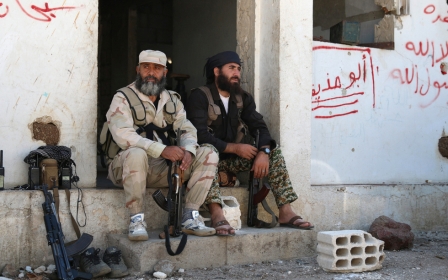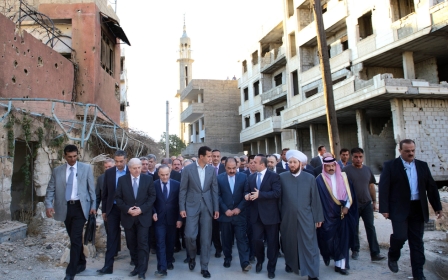Syria ceasefire appears to hold as it enters first full day

Hopes that this ceasefire can hold have been muted, with uncertainty looming about which groups will actually be included in the ceasefire.
Russia said on Monday it would continue to target "terrorist" groups during a ceasefire in Syria.
"Today from 7pm [local time] the cessation of hostilities is being resumed across all the territory of Syria," senior Russian military official Sergei Rudskoi said at a briefing.
However, Rudskoi also stressed that Russia would "continue to carry out strikes against terrorist targets" which includes Fateh al-Sham, formerly the al-Qaeda linked Nusra Front, and the Islamic State (IS) group targets.
Syrian state TV likewise warned that while the army would observe the ceasefire, and would hold to a seven-day "freeze" on military operations, it reserved the right to "retaliate" against any hostilities.
Fateh al-Sham's cooperation with other rebel groups has been a key sticking point and led to the failure of a February ceasefire deal, when Russia continued bombing rebels it considered to be aligned with the group.
"Targeting Fateh al-Sham and treating it in a different way to the Iran-backed Shia militia, and pushing us or expecting us to agree to a package where part of it is to bomb them, is going to create a lot of internal problems, and it's already happening on the ground, and there's a lot of tension," an opposition source told Reuters.
"We want to cancel out any possibility of internal confrontation by clearly stating that we do not agree or endorse the idea of targeting Fateh al-Sham because the other side does have other groups that fit the designation criteria, but they are acting freely and with coverage inside Syria."
Opposition seeks guarantees
A major coalition of Syrian opposition groups initially said its members would comply with the latest cessation of hostilities but then asked for certain "guarantees" to be made before agreeing to the deal.
"We want to know what the guarantees are," said Salem al-Muslet, spokesman for the High Negotiations Committee, which groups political and military opposition factions.
"What is the definition that has been chosen for 'terrorism,' and what will the response be in case of violations? We are asking for guarantees especially from the United States, which is a party to the agreement."
On Sunday, an HNC spokesperson told Reuters on condition of anonymity that it had outlined a list of "concerns" over the deal but that "the decision is taken".
According to reports concerning the deal, if the current ceasefire holds, Moscow and Washington will begin closer cooperation in their fight against groups such as IS and Fateh al-Sham, while the Syrian air force will be sidelined.
The deal will reportedly be backed by "the largest groups," including Ahrar al-Sham, a militant group that had vocally criticised the deal, the HNC source said, although he did pour scorn on the concept that the US and Russia would unite their efforts in Syria.
"From our point of view it's business as usual," the source said, adding that it was unclear how the United States and Russia planned to cooperate on targeting the banned militants.
The claim that Ahrar al-Sham would back the deal also appeared to contradict a declaration from its deputy leader on Sunday rejecting the ceasefire.
In a statement on YouTube, Ali al-Omar said that the deal would only serve to "reinforce" the government of Syrian President Bashar al-Assad and "increase the suffering" of civilians.
"The people cannot accept half-solutions," Omar said in the video to mark the start of the Eid al-Adha holiday that began on Monday.
"The Russian-American deal... will send all the sacrifices and gains of our people who have risen up into smoke. It will only serve to reinforce the regime and surround the revolution militarily," he said.
Omar also rejected the aspect of the deal in which Washington is supposed to convince mainstream opposition fighters to break their alliance with Fateh al-Sham, with the powerful former al-Qaeda affiliate in Syria also stressing that it would refuse to accept the deal.
"It's simple - the Russian-American deal is intended to eliminate those who protect Syrians," Fateh al-Sham spokesman Mostafa Mahamed wrote on Twitter.
Assad vows to take back country
Syrian President Bashar al-Assad said that he would fight on to retake the whole country just hours before the US-Russia deal was announced.
"The armed forces are continuing their work, relentlessly and without hesitation, regardless of internal or external circumstances," he said.
The United States on Tuesday also lifted some of the sanctions it imposed on Russia's state arms trader, Rosoboronexport, concerning a helicopter project, RIA news agency quoted Russia's Foreign Ministry as saying on Tuesday.
Qatar on Tursday morning welcomed the ceasefire deal in Syria, saying compliance would hasten a political solution and facilitate humanitarian help.
The Qataris also urged world powers to ensure Syrian government forces implement and adhere to the terms of the agreement on the ground.
This article is also available in French on Middle East Eye French edition.
New MEE newsletter: Jerusalem Dispatch
Sign up to get the latest insights and analysis on Israel-Palestine, alongside Turkey Unpacked and other MEE newsletters
Middle East Eye delivers independent and unrivalled coverage and analysis of the Middle East, North Africa and beyond. To learn more about republishing this content and the associated fees, please fill out this form. More about MEE can be found here.




